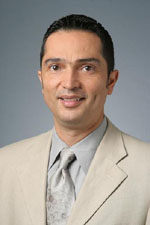|
Back
| Biography |
 |
|
Dr. Andrés Sciolla obtained his M.D.
degree from the University of Chile in 1983, and finished his postgraduate
training in psychiatry in 1989. He came to UCSD in 1991, and worked as a
clinical research fellow at the Human Circadian Pacemaker Laboratory, the
HIV Neurobehavioral Research Center, and the Geriatric Psychiatry Clinical
Research Center until 1997. Dr. Sciolla conducted studies and published in
the areas of HIV-associated dyssomnia, psychiatric morbidity among populations
at risk for HIV, and health-related quality of life among older patients
with psychosis. Subsequently he completed his psychiatry residency, and
joined UCSD's faculty upon graduation in 2001 as an Assistant Clinical Professor.
He now cares for ambulatory patients at the Outpatient Psychiatric Services and
the Maria Sardinas Center in San Ysidro. Since 2004 he has been an Associate
Residency Training Director. Dr. Sciolla's career currently focuses in research
on the medical outcomes among adult survivors of childhood trauma. In addition,
he is involved in teaching patient-physician communication to non-psychiatric
medical trainees and psychotherapy to psychiatric trainees.
Dr. Sciolla's National Institutes of Health (NIH),
National Center on Minority Health & Health Disparities (NCMHD),
Comprehensive Research Center in Health Disparities (CRCHD) funded pilot
project is described below. |
See Also: Selected Publications
Pilot Research
Dr. Sciolla's study was an HIV prevention intervention for Latino men who have sex with
men and report childhood trauma. It is hypothesized that psychological treatment of
childhood trauma will result in decreased frequency of HIV risk behaviors and
trauma-based psychopathology, as well as increased adaptive coping and cognition.
Childhood trauma is a well-established risk factor for HIV disease. The psychological
treatment used was eye movement desensitization and reprocessing (EMDR), which is among
the recommended treatment modalities for posttraumatic stress disorder. The study
examined the hypotheses:
- That EMDR will be associated with greater reduction of HIV risk behaviors.
- That EMDR will be associated with larger reductions in overall indices of
psychopathology, including depression, anxiety, dissociation, and
posttraumatic stress, as compared to a control condition.
In addition, the project studied the moderating or mediating effect of homophobia and
acculturation on the relationship between childhood trauma and HIV risk behaviors.
[ Top ]
|
